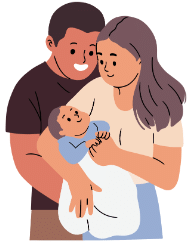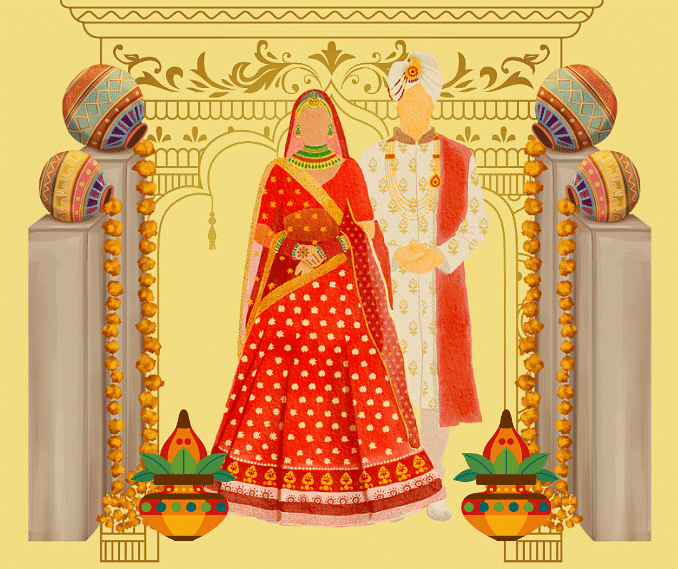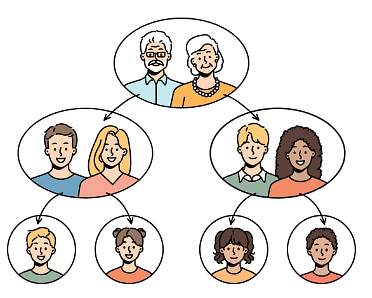Changing Families Class 4 Notes EVS Chapter 9
| Table of contents |

|
| A New Arrival! |

|
| New Place |

|
| It’s a Wedding! |

|
| My Family – Yesterday, Today, Tomorrow… |

|
| Law on Child Marriage |

|
| Key Points |

|
Families change in many ways, such as welcoming new members, moving to new places, or celebrating weddings. These changes can bring excitement and new experiences. In this chapter, we will explore different reasons for changes in families and understand how they affect our daily lives.
A New Arrival!
- There is great excitement in Nimmi’s family.
- Nimmi has a new baby sister, making their family now have six members. Nimmi is excited to play and have fun with her new sibling.
- Her mother now has the challenging task of caring for the newborn, but the whole family is happy about the baby's arrival and will take special care of her.

- Nimmi will learn how to be a good big sister and help her parents take care of the new baby.
- It's a special time for Nimmi and her family to celebrate and welcome the new addition to their family!
A new baby in the family brings excitement and joy. Everyone's routines change as they care for the newborn, and older siblings learn new responsibilities. This period strengthens family bonds and introduces new dynamics.
Changes in Daily Life:
- Nimmi: She will spend more time helping with the baby and might have to share her toys and space.
- Mother: Nimmi’s mother will have more work, like feeding and taking care of the baby.
- Father: He might help more at home or spend time playing with Nimmi to keep her happy.
- Grandmother: She will also help take care of the baby and support Nimmi’s mother.
- Uncle: He might help by doing more work around the house or looking after Nimmi.
New Place
- Tsering's father got a letter from his job saying he got a promotion but has to move to a new city.
- Tsering, along with his parents will be relocating to a new city.
- Tsering will attend a new school and make new friends.

- Tsering might feel sad because he'll miss his friends and school, but also excited to explore a new place.
- His mom might feel happy for the promotion but worried about adjusting to a new city. The family might feel both happy and sad about the change.
- After the move, Tsering's family will have to adjust to a new home, school, and neighborhood.
- Tsering will make new friends and go to a different school in the new city.
- This change might be hard at first, but it could also bring new opportunities and experiences.
From this, we learn that sometimes families have to move because of work, and it can bring mixed feelings. We also learn that adjusting to a new place takes time, but it can also lead to new adventures and friendships.
It’s a Wedding!
- Nazli's older cousin's brother is getting married, which has brought excitement to her family.
- While Nazli's sister-in-law may miss her own family, it's a joyous occasion to celebrate.

- After the wedding, Nazli's family might have to adjust to having the new bride in their home.
- They will celebrate the wedding with special food, clothes, songs, and dances.
- Nazli's sister-in-law's family will also welcome the groom as a new member of their family.
From this, we learn that weddings bring happiness and changes to families. We also learn about different traditions and customs related to weddings, like special food and clothing. It's important to celebrate and welcome new members into the family with love and joy.
My Family – Yesterday, Today, Tomorrow…
- We learned that families change over time.
- Just like how our grandparents' families were different when they were young, our families also change.
- By drawing family trees of our grandparents' and our own families, we can see these changes.
- Maybe there are more or fewer family members now, or some members have moved away.
- This shows us that families evolve for different reasons, like births, marriages, or people moving.
- It's important to understand and appreciate these changes because they make our families unique and special.

Law on Child Marriage
Law on Child Marriage
- The Prohibition of Child Marriage Act, 2006, set the minimum age for marriage for girls at 18 and for boys at 21.
- However, despite these laws, child marriages still happen, especially in rural areas, which can disrupt a child's education.
- Some village councils and activists are working to help children, especially girls, access education and understand their rights.
- It shows us that even though laws exist, it's important to raise awareness and take action to protect children from harmful practices like child marriage.
Conclusion
The chapter "Changing Families" shows how families grow and change in different ways, such as through new births, moving to new places, and marriages. These changes bring new responsibilities and experiences, helping family members adapt and grow together.
Key Points
- A new baby brings joy and changes in family routines, with older siblings taking on new responsibilities.
- Relocation for work involves adjusting to new homes, schools, and making new friends.
- Weddings bring new family members and involve cultural traditions and celebrations.
- Families evolve due to births, relocations, and marriages, affecting daily routines and relationships.
- Laws prevent early marriage, encouraging education and personal growth.
- Family trees illustrate family history and changes, strengthening connections with heritage.
|
49 videos|217 docs|54 tests
|
FAQs on Changing Families Class 4 Notes EVS Chapter 9
| 1. What are some key points to consider when discussing changing families in class 4? |  |
| 2. How does the law on child marriage affect families? |  |
| 3. How can families navigate the challenges of changing dynamics over time? |  |
| 4. What are some ways in which families can celebrate and honor their past, present, and future? |  |
| 5. How can individuals advocate for the prevention of child marriage in their communities? |  |




















